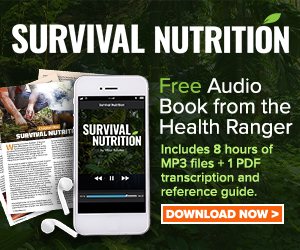
Recalls of Automated External Defibrillators Are Common (press release)
Friday, July 07, 2006 by: NewsTarget
Tags: health news, Natural News, nutrition
- When the MASS MEDIA is backing your movement, you are NOT the "RESISTANCE"
- Elon Musk’s Starlink revolutionizes off-grid communication with portable satellite solutions
- Mainstream media finally admits lockdowns were a disaster
- Zuckerberg's Meta: A double game on China and censorship
- Democratic Party used taxpayer dollars to fund THUG UKRAINIAN SPIES to target Vice President J.D. Vance and other American leaders
- Death by CHEMICAL RESTRAINTS: How Australia’s elderly and vulnerable were SEDATED into early graves during the COVID scandal
- RFK Jr. takes on Big Pharma: How diet could end the antidepressant era
- Tiny plastic beads could revolutionize energy generation
- Ballot drop boxes set ablaze in Oregon and Washington, prompting security concerns ahead of election
- China’s galactic gamble: An orbiting SOLAR ARRAY to revolutionize renewable energy
- Migrants are taking advantage of recent hurricanes to scam residents and loot their homes
- Modern science uncovers brain-boosting power of ancient spice coriander and its key compound linalool
- The Health Ranger releases “Vaccine Zombie” song and music video, using AI-animated zombies for the music video
- Zelensky's arrogance and entitlement cost Ukraine more territory and lives as RUSSIA ADVANCES, taking Constantinople
- Israeli soldiers accused of even more torture and abuse in the West Bank
- Former horse rancher and 6,000 other plaintiffs are suing Syngenta after paraquat exposure led to Parkinson's Disease
- Jimmy Kimmel ‘illegally’ tells Trump voters they can wait until Friday
- OpenAI whistleblower who dissented against how the company trained ChatGPT found dead
- California's social media censorship law struck down: A victory for free speech or a threat to online safety?
- The Health Ranger releases “Vaccine Zombie” song and music video, using AI-animated zombies for the music video
- EPA advisor admits the agency is funneling billions to climate groups ahead of Trump’s return to White House
- Former horse rancher and 6,000 other plaintiffs are suing Syngenta after paraquat exposure led to Parkinson's Disease
- Modern science uncovers brain-boosting power of ancient spice coriander and its key compound linalool
- Congratulations to the FULLY UNVACCINATED as you resisted the COVID-19 PROPAGANDA MACHINE fueled by over $100 BILLION
- Michigan sheriff announces criminal investigation into 2020 election crimes, Dominion Voting Systems
- Florida takes a stand: DeSantis proposes permanent ban on mRNA vaccine mandates
- Ballot drop boxes set ablaze in Oregon and Washington, prompting security concerns ahead of election
- Migrants are taking advantage of recent hurricanes to scam residents and loot their homes
- Israeli soldiers accused of even more torture and abuse in the West Bank
- Peter Rost exposes Big Pharma corruption in his book “The Whistleblower: Confessions of a Healthcare Hitman”
- The pandemic as a tool for INDOCTRINATION: Understanding “The Indoctrinated Brain” by Dr. Michael Nehls
- House Intelligence Committee calls for the ARREST and PROSECUTION of Dr. Anthony Fauci
- Russia warns citizens against traveling to the United States, Canada and the European Union
- Jena Griswold “breaks” 2024 election in Colorado: Results will be 100% non-certifiable, warns Patrick Byrne
- Sermon 30: How Jesus reveals Caesar’s FAKE CURRENCY and FALSE AUTHORITY
- Trump administration takes on global censorship: A new frontier for free speech advocacy
- EPA advisor admits the agency is funneling billions to climate groups ahead of Trump’s return to White House
- RFK Jr. clears key hurdle: Sen. Susan Collins backs controversial HHS nominee, signaling a new era for health policy
- Congratulations to the FULLY UNVACCINATED as you resisted the COVID-19 PROPAGANDA MACHINE fueled by over $100 BILLION
- The Health Ranger releases “Vaccine Zombie” song and music video, using AI-animated zombies for the music video
- Global leaders unite to clamp down on “misinformation” with UN-backed Cascais Declaration
- DIRTY VACCINES: Dr. Anthony "Fraudulent" Fauci, King of the Covid scamdemic, admits "We don't do placebo trials on vaccines"
- Fake "CLIMATE CHANGE" will continue to devastate any regions the globalists and ruling elite want to purchase at a discounted price
- Mint: The ancient herb that refreshes, soothes and heals
- Trump administration takes on global censorship: A new frontier for free speech advocacy
- South Korean banks halt silver bar sales amid global and domestic uncertainty
- Democrats cry as “liberal supply chains” are wiped out and their favorite multi-billion dollar money machine is shut down
- The pandemic as a tool for INDOCTRINATION: Understanding “The Indoctrinated Brain” by Dr. Michael Nehls
- PBS shutters DEI office in wake of Trump’s executive order
- Ex-FBI Chief EXPOSES disgraceful government coverups of Oklahoma City Bombing, Kennedy assassinations, 9/11 WTC, and "Terrorism" as plot to destroy Constitution
- “Cancer Gag Act” threatens farmers’ rights and public health: A dangerous push for corporate immunity
- Federal judge backs Trump's mass firings, clearing path for government downsizing
- Trump's impressive political comeback against all odds makes headlines around the world
- Deep State Power Grab? Corporate Transparency Act threatens nonprofits and small businesses – Andy Schlafly discusses potential impacts with Mike Adams
- Red Cross issues warning to stop blood plasma donations from vaccinated people
- Scientists confirm: GENIUS brain function can be spontaneously unleashed in humans without any apparent cause
- HYSSOP: What research reveals about the health benefits of this ancient holy herb
- EPA advisor admits the agency is funneling billions to climate groups ahead of Trump’s return to White House
- Two containers with completed ballots fall out of truck in Florida
- Fully vaccinated about to see “tsunami” of illness and death, warns virologist
- Today I asked our AI language model “Neo” about which phytonutrients or phytochemicals can block the spike protein related to SARS-CoV-2 … Here is what it answered…
- Global leaders unite to clamp down on “misinformation” with UN-backed Cascais Declaration
- DATA: England’s vaccinated population had close to one million deaths in 23 months; unvaccinated population had less than 61,000 deaths over the same period
- BREAKING: 2025 NDAA authorizes mandatory military draft of WOMEN across America… as Pentagon pursues global NUCLEAR war with both Russia and China at the same time
- ENGINEERED FAMINE: Oregon starts SHUTTING DOWN small farms “to protect the people”
- Michael Yon warns of a ZIONIST TAKEOVER in Trump’s second administration
- Ozempic and Wegovy weight loss drugs are injectable LIZARD VENOM PEPTIDES that may unleash a devastating wave of organ failure… side effects align with symptoms of SNAKE BITES
- BOMBSHELL: DNA testing kits are a SCAM to develop ethnic-specific bioweapons
- NASA admits that climate change occurs because of changes in Earth’s solar orbit, and NOT because of SUVs and fossil fuels
- These 13 countries just signed an agreement to engineer a global FAMINE by destroying food supply
- Careless Whisper: AI-powered transcription tool being used by hospitals found to invent chunks of text no one ever said
- Coriander seeds: Ancient medicine backed by modern science
“AEDs provide automated heart rhythm analysis, voice commands, and shock delivery and can be used by individuals with minimal training or experience,” explains the study’s lead author William H. Maisel, MD, MPH, director of the Pacemaker and Device Service at Beth Israel Deaconess Medical Center (BIDMC) and Assistant Professor of Medicine at Harvard Medical School. “As a result, widespread installation of AEDs has occurred in recent years.” In fact, he adds, the annual number of the devices distributed between 1996 and 2005 increased almost 10-fold, from fewer than 20,000 to nearly 200,000.
“Public places such as airports, sports arenas and casinos are now routinely outfitted with AEDs and the U.S. Food and Drug Administration [FDA] has approved certain AED models for home use,” he says. “Unfortunately, as AED use has increased, so too has the number of recalled devices.”
Maisel and his colleagues reviewed weekly FDA Enforcement reports to identify recalls and safety alerts (collectively referred to as “advisories”) affecting AEDs. Enforcement reports are issued by the FDA to notify the public about potentially defective medical devices which may not function as intended.
During the study period – beginning in 1996 and ending in 2005 – the authors found that the FDA issued 52 advisories involving either AEDs or critical AED accessories, affecting a total of 385,922 devices.
“The results showed that during this 10-year study period, more than one in five AEDs were recalled due to a potential malfunction,” says Maisel, noting that electrical and software problems were the most common reasons for the advisories being issued. In addition, he adds, the number of devices that were recalled increased significantly over time.
In a separate analysis of publicly available FDA data, the authors found that during the same 10-year period, 370 confirmed AED malfunctions occurred during attempted resuscitation of cardiac arrest victims.
“While AED malfunctions do occasionally occur, the number is small in comparison to the number of lives saved by these important devices,” notes Maisel. “However, because the number of AEDs in distribution continues to increase rapidly, efforts should be directed at developing a reliable system to locate and repair potentially defective devices in a timely fashion.”
Maisel and coauthor Jignesh S. Shah, MD are members of the Cardiovascular Division, Beth Israel Deaconess Medical Center, Boston. William Maisel is an FDA consultant and chair of the FDA Circulatory System Medical Device Advisory Panel. The opinions expressed herein are the personal views of the authors and do not necessarily represent the policies, practices, positions or opinions of the FDA.
Beth Israel Deaconess Medical Center is a patient care, teaching and research affiliate of Harvard Medical School and ranks fourth in National Institutes of Health funding among independent hospitals nationwide. BIDMC is clinically affiliated with the Joslin Diabetes Center and is a research partner of the Dana-Farber/Harvard Cancer Center. BIDMC is the official hospital of the Boston Red Sox. For more information, visit http://www.bidmc.harvard.edu.
Health news at FETCH.news
Get independent news alerts on natural cures, food lab tests, cannabis medicine, science, robotics, drones, privacy and more.
Take Action: Support Natural News by linking to this article from your website
Permalink to this article:
Embed article link: (copy HTML code below):
Reprinting this article:
Non-commercial use OK, cite NaturalNews.com with clickable link.
Follow Natural News on Facebook, Twitter, Google Plus, and Pinterest
Science News & Studies
Medicine News and Information
Food News & Studies
Health News & Studies
Herbs News & Information
Pollution News & Studies
Cancer News & Studies
Climate News & Studies
Survival News & Information
Gear News & Information
News covering technology, stocks, hackers, and more



"Big Tech and mainstream media are constantly trying to silence the independent voices that dare to bring you the truth about toxic food ingredients, dangerous medications and the failed, fraudulent science of the profit-driven medical establishment.
Email is one of the best ways to make sure you stay informed, without the censorship of the tech giants (Google, Apple, Facebook, Twitter, YouTube, etc.). Stay informed and you'll even likely learn information that may help save your own life."
–The Health Ranger, Mike Adams













































